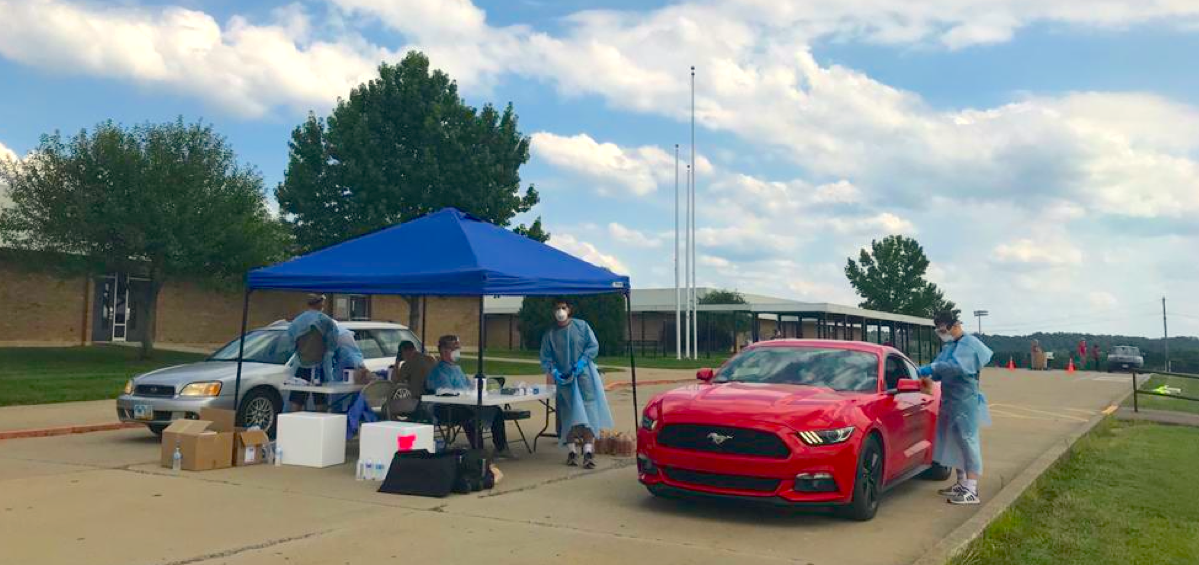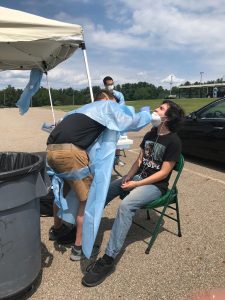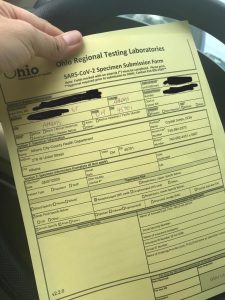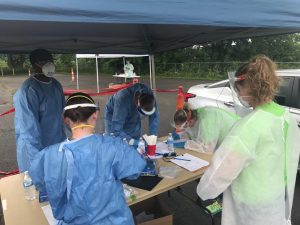News

COVID-19: Athens County Health Dept. Is Preparing For the Fall Semester
By: Claudia Cisneros
Posted on:
ATHENS, Ohio (WOUB) — The annual August ritual of Ohio University students returning to Athens has a different impact during this COVID-19 pandemic. The university will start fall semester with approximately 2,000 students allowed on the Athens campus. But along with that ten percent of the overall campus enrollment approved for face-to-face classes and/or dorm living are the students who have returned to the city to participate in their online courses from their off-campus housing. The Athens City-County Health Department is concerned but ready.
“I was informed by some people of the health department that there were congregations of students in various places. On porches and bars.” says Athens City-County Health Commissioner, Dr. James Gaskell.
Gaskell acknowledges there is a concern that Athens will see an upsurge of cases in the next few days that corresponds to young people again attending bars and private parties, many of them without masks or social distancing.
He recalls the recent upsurge of cases in Athens after the 4th of July celebrations, that generated the Level 3 of Public Health Emergency back in July (it is currently down to Level 1) and assures his office is prepared.
“If that is going to create another surge for us, we should see in the next week to ten days. We will be following that closely.”
Gaskell says students will not be tested unless symptomatic because a negative result could give false reassurance. But officials will be doing contact tracing to follow up when a symptomatic student tests positive.

Contact tracing is a public health protocol that is used to identify individuals who have been in contact with the person infected.
“We call the individual who’s been positive. Inform that they’ve tested positive. Then they are told that they need to isolate for ten days,” says Gaskell.
People who tested positive and have symptoms of coronavirus will have to stay in isolation for ten days only, if they have improving symptoms and no fever for 24 hours. Those who have tested positive but have no symptoms are the ‘asymptomatic’ and will also be asked to isolate themselves for ten days.
“The CDC now has some considerable data to support the idea that after ten days you’re not contagious. Their data shows that the amount of virus that is available in you after ten days is not enough virus to replicate, to reproduce itself, to cause disease.” This is if you have mild to moderate symptoms. People with more severe to critical illness “or severe immunocompromise likely remain infectious no longer than 20 days after symptom onset,” according to the CDC.
Once someone tests positive contact tracers work to determine the people the infected person interacted with two days prior to their test or prior to getting sick.
“They are contagious two days before they get sick,” explains Gaskell.
“We have four public health nurses at the Athens City-County Health Department and they have trained some other individuals, the environmental health staff,” says Gaskell, and adds that they have enlisted the help of the university’s nurses to help with the contact tracing once the fall semester begins.

But who are considered close contacts? Not everyone that you interact with classifies as a close contact. There is sort of a sociological criteria, Gaskell says.
“If you kiss them, you are a contact. If you hug them, you are a contact. Because you’ve been really closely associated with them. If you spend 15 minutes within 6 feet of an infected person you are considered a contact.”
Even with a mask on if you spend 15 minutes within 6 feet of a person with coronavirus you are considered a contact. Except for the use of an N-95 mask, the CDC says that “at this time, differential determination of close contact for those using fabric face coverings is not recommended” because the CDC doesn’t know how (well or not) you are wearing your mask.
The contact tracers will look for the ‘close contacts’ who interacted with the person infected two days before the infected developed any symptoms, since people can be contagious two days before symptoms show.
Those contacted will be told to quarantine for two weeks even if they don’t have any symptoms. Fourteen days is the time the virus can take to incubate. Only if during this period they become ill or symptomatic, they will be tested. And if they test positive, then the contact tracing starts all over again.
“The purpose of all these is to decrease dissemination of disease throughout our society. So we can isolate the people who are sick. Prevent them from spreading the disease,” affirms Gaskell.
Individuals who tested positive can still test positive for about three months, says Gaskell, but “that doesn’t mean that you are contagious for three months. After ten days you might have a small amount of virus that is not contagious.”

Another part of the strategy were the free pop-up testings offered on August for anyone in Athens County without the need of an appointment, a doctor’s referral or any symptoms. Out of the 871 individuals tested (515 on August 7 and 536 on August 14) only 5 were positive for coronavirus.
According to Dr. Gaskell, three of them were from Athens, one from Meigs and one from Hocking. And around half of all individuals tested were under 29 years old.
The tests administered during the two pop-up testings at Athens High School were not the rapid tests sometimes associated with a 20% false negativity but PCR tests (Polymerase Chain Reaction). “PCR test are the gold standard of testing. It’s very sensitive and it’s very accurate,” says Gaskell.
But having only five positive cases should not be a reason not to worry, for it takes only one person to provoke numerous infections. This is why the Athens City-County Health Department is enforcing contact tracing.
![A group of nurses and health personnel has been trained to help out with 'Contact Tracing' in Athens coming the Fall semester at OU [Claudia Cisneros | WOUB].](https://woub.org/wp-content/uploads/2020/08/COVID-MUSTRAS-LANCASTER-300x225.jpeg)
According to Gaskell, there are 10 ventilators and 15 Intensive Care Units (ICU) in Athens County. Even though, he says that “O’Bleness Hospital doesn’t anticipate having to use those. It would only be in an emergency kind of situation. And then, after being put in a ventilator, they will be transferred to other hospitals.”
Those other hospitals were patients will be transferred before needing a ventilator are Riverside Hospital, Grant Medical Center and Marion General Hospital.
“And if Columbus is overwhelmed, the three major hospital systems in Columbus plan to open a large center at the Convention Center. They have provided for beds and IV solutions and nurses. They can handle up to a thousand more patients if they have a surge,” explains Gaskell.
Ohio’s coronavirus call center is open to answer questions from 8 a.m. to 9 p.m. daily. The hotline number is 1-833-4-ASK-ODH or 1-833-427-5634. More information is available at coronavirus.ohio.gov.

